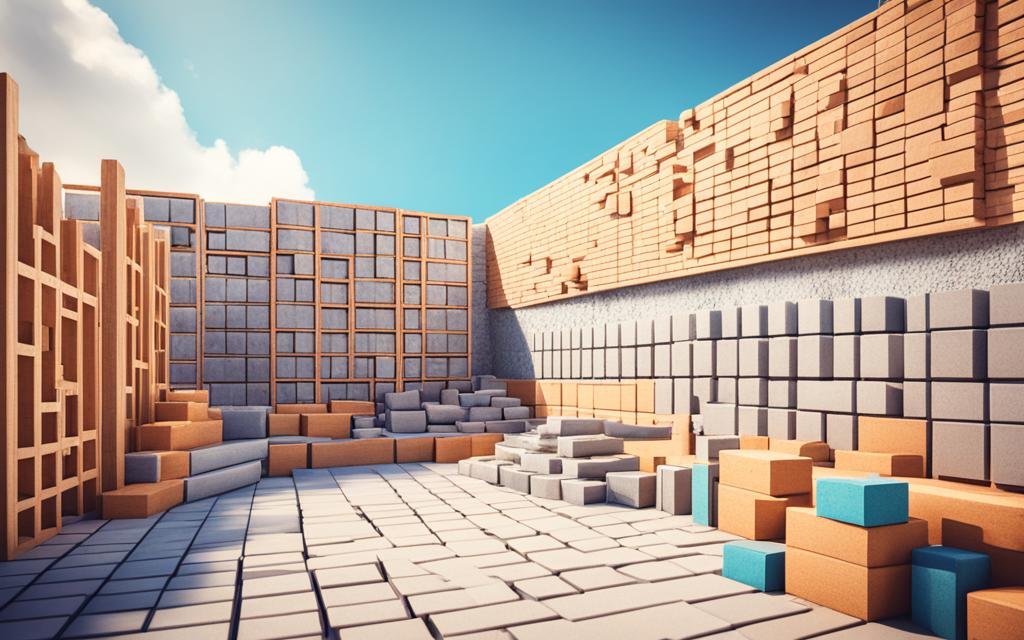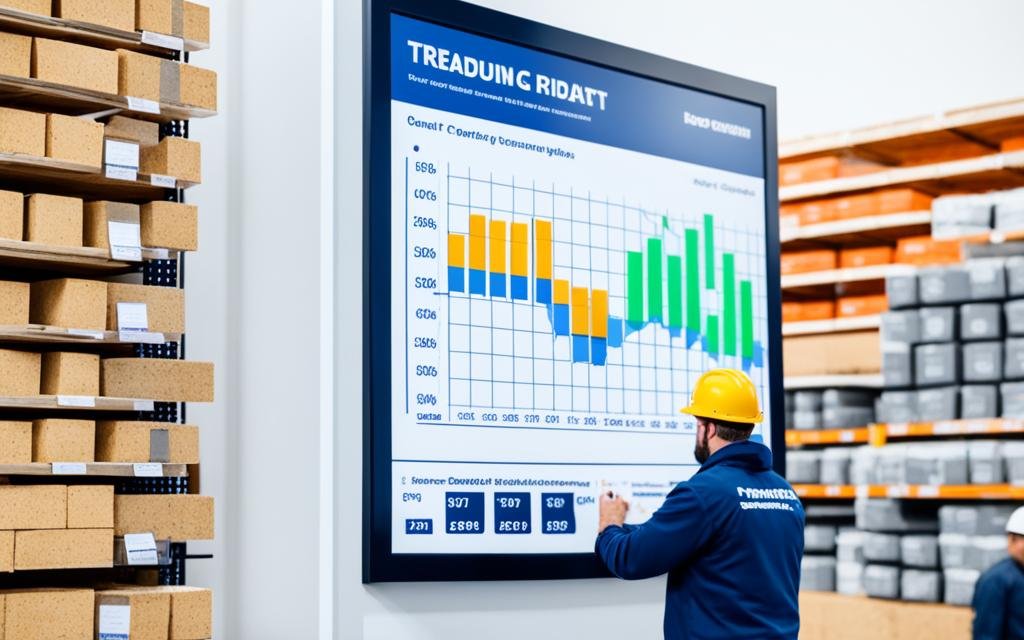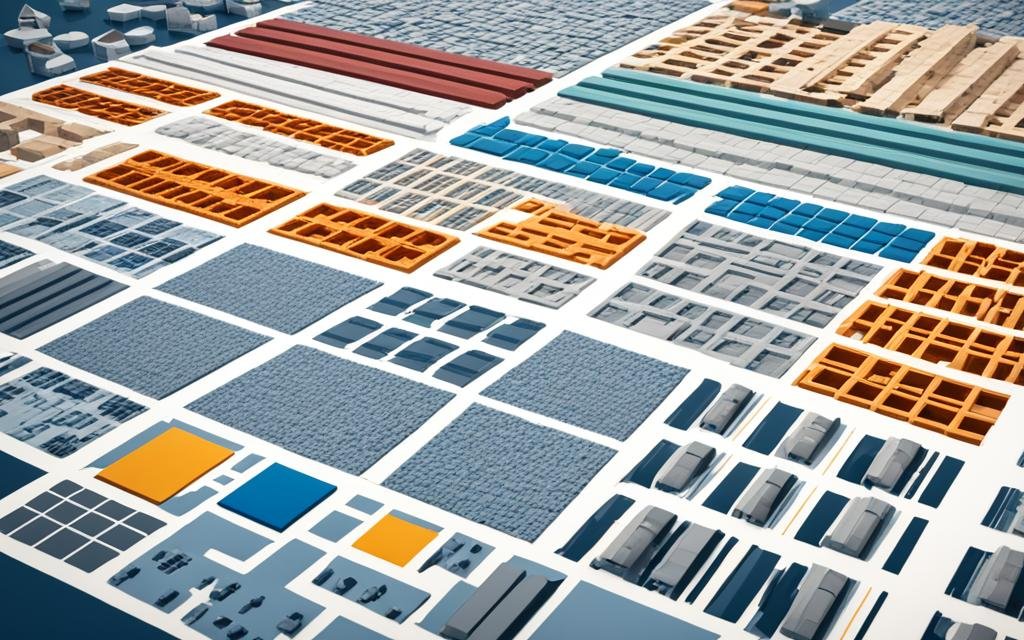The construction industry is very competitive. To stand out and increase sales, embracing digital marketing is key. Online advertising helps you reach more people, get valuable leads, and boost your sales.
Today, having a strong online presence is crucial. People look for building materials online, and if you’re not there, you’re missing out. Digital marketing for building materials can improve your visibility, attract more leads, and make your brand a trusted name in the industry.

To succeed with digital marketing, you need a detailed strategy. This should include SEO, content marketing, social media marketing, and email marketing. Make your website easy to find by using the right keywords. Create content that engages and informs. And promote your brand on social media to reach your audience and drive more traffic to your site.
This article will explore the key parts of a successful digital marketing strategy for building material suppliers. We’ll cover keyword research, SEO, content marketing, and social media. You’ll get actionable insights and best practices to enhance your online presence and increase sales in the competitive construction industry.
Key Takeaways:
- Digital marketing is essential for building material suppliers to compete effectively in the construction industry.
- A strong online presence helps reach a wider audience, generate leads, and increase sales.
- Investing in digital marketing improves visibility, attracts qualified leads, and establishes brand authority.
- A comprehensive strategy should include SEO, content marketing, social media marketing, and email marketing.
- Optimizing your website for relevant keywords and creating engaging content drives more traffic and boosts sales.
The Importance of a Strong Online Presence for Building Material Suppliers
In today’s digital world, having a strong online presence is key for building material suppliers. Most consumers look online before buying products. It’s vital to be seen on different digital platforms.

Creating a professional website is a big part of a strong online presence. Your website is the base of your digital marketing. It shares info about your products and services and shows your industry know-how. Make sure it works well on mobiles, as more people use phones to search for construction materials.
Search Engine Optimization (SEO) is a critical factor in digital marketing, emphasizing its importance for attracting potential buyers.
Being on big social media sites like Facebook and Google My Business helps you reach potential customers. Posting regular, interesting content keeps your followers engaged and builds trust in your brand.
| Social Media Platform | Key Demographic | Potential Benefits |
|---|---|---|
| 29% of users aged 50-64 | Advertising, product information, lead generation | |
| Majority of users aged 18-29 | Visual product showcasing, brand awareness | |
| 89% of B2B marketers use for lead generation | Connecting with wholesale buyers, industry networking |
Choosing the right social media platforms is crucial for your marketing strategy. Facebook is great for businesses of all sizes. Use Facebook groups to connect with customers and share product info.
By focusing on ecommerce and lead generation online, you can reach your audience, show off your products, and boost sales for your business.
Developing a Comprehensive Digital Marketing Strategy
To win in the building materials market, you need a strong digital strategy. It should match your business goals and speak to your audience. A good strategy includes setting your brand, knowing your customers, and setting goals.
Defining Your Brand Strategy
Your brand strategy is the base of your digital marketing. It should show what makes you special and stand out. First, think about what your customers need and how your products help them. Then, make messages that show your knowledge and why people should pick your materials.

Creating Buyer Personas
To connect with your audience, you must know what they want and do. Make buyer personas by learning about their lives, why they look for building materials, and what they think. This helps you make content and ads that hit the mark.
74% of marketers believe social media is an effective tool for reaching potential clients in the construction industry.
Setting Clear Goals and Objectives
A good digital marketing plan needs clear goals you can measure. These could be more website visitors, more leads, more sales, or more people knowing about your brand. Think about these when setting your goals:
- Specific: Know exactly what you want to achieve
- Measurable: Have ways to track your progress
- Attainable: Make sure your goals are realistic
- Relevant: Make sure your goals fit with your business plan
- Time-bound: Set deadlines to keep things moving and to stay on track
By setting your brand strategy, making buyer personas, and setting clear goals, you’re ready for a focused, successful digital marketing plan. This plan will help you succeed in the building materials industry.
| Strategy Component | Key Considerations |
|---|---|
| Brand Strategy | Unique value proposition, target audience pain points, differentiation |
| Buyer Personas | Demographics, motivations, common themes from customer feedback |
| Goals and Objectives | Specific, measurable, attainable, relevant, time-bound (SMART) |
Optimizing Your Website for Search Engines (SEO)
Search engine optimization (SEO) is key for building materials suppliers’ digital marketing success. With 93% of online experiences starting with a search engine, making sure your site draws in potential buyers is crucial.

To boost SEO for building materials, focus on three main areas. These are conducting deep keyword research, using on-page optimization, and making your site fast and mobile-friendly.
Conducting Keyword Research
Keyword research is the base of a strong SEO plan. By finding the right keywords for your business, you can make your website more attractive to potential customers. Long-tail keywords, like “building material suppliers in Harrisburg, PA,” are better because they’re specific and bring in more interested people.
Keywords should be added to title tags, meta descriptions, headings, and throughout the page.
On-Page Optimization Techniques
After picking your keywords, it’s time to optimize your pages. This includes:
- Adding targeted keywords in the first 100 words of content, title, meta description, and throughout the text
- Writing unique meta descriptions to get more clicks from search engines
- Creating an XML sitemap to help search engines find and index all your pages
- Designing titles and headings that improve user experience and help search engines understand your content
- Using images to boost search rankings and visibility, considering speed, format, and alt tags
Also, creating content that’s over 2,000 words can keep users on your site longer. This tells search engines your site is valuable.
Improving Website Load Time and Mobile-Friendliness
How fast and easy your site loads is crucial for keeping users and affecting search rankings. Users want sites to load in two seconds or less. A slow site can cause people to leave quickly.
- Optimize images and media to be smaller without losing quality
- Use fewer plugins and scripts to avoid slowing down your site
- Choose a responsive design that works well on all devices
- Use browser caching to store files on users’ devices
| SEO Factor | Impact on Building Materials Websites |
|---|---|
| Keyword Research | Finds the best keywords to target potential customers |
| On-Page Optimization | Makes sure your content is easy to use and search engine friendly |
| Site Speed and Mobile-Friendliness | Improves user experience, lowers bounce rates, and helps with search rankings |
By focusing on these SEO areas, you can draw in more qualified leads, boost your search rankings, and increase sales for your business.
Leveraging Content Marketing to Engage Your Target Audience
Content marketing is a key way for building materials companies to connect with their audience. It helps them stand out as leaders in the industry. By making content that is valuable, informative, and engaging, you can draw in potential customers. This content helps you build strong relationships with your audience over time.

Creating Valuable and Informative Blog Posts
Writing blog posts is a great way to reach your audience. These posts should answer common questions, offer helpful tips, and highlight how your products are used. This makes your company a go-to resource in the building materials field. Think about these topics for your blog posts:
- How to choose the right building materials for specific projects
- Case studies showcasing successful projects using your products
- Industry trends and innovations in building materials
- Tips for making your products last longer and work better
Regularly posting valuable blog content can boost your website’s search engine ranking. It also brings more visitors to your site, leading to more leads and sales.
Developing Engaging Video Content
Video content is getting more popular in the building materials industry. It lets you show off your products and expertise in a fun and dynamic way. Consider making videos like:
- Product demos and guides on how to install them
- Footage of how you make your products
- What your customers say about your products
- Interviews with experts and thought leaders in the field
Using video can increase engagement by up to 40% compared to other content types. Adding video to your marketing can help grab your audience’s attention and build stronger connections with them.
Utilizing Infographics to Convey Complex Information
Infographics are great for making complex info easy to understand. They use visuals like charts and graphs to share important details about your products and services. Think about making infographics that:
- Compare different building materials
- Highlight what makes your products special
- Share industry stats and trends
- Explain tough concepts or processes in building materials
Adding infographics to your marketing can make your content easy to share on social media and other places. This helps you reach more people and attract new customers.
| Content Type | Benefits | Examples |
|---|---|---|
| Blog Posts | Improve SEO, establish thought leadership, nurture leads | How-to guides, case studies, industry trends |
| Video Content | Increase engagement, showcase products, build trust | Product demos, behind-the-scenes, testimonials |
| Infographics | Convey complex information, increase shareability, attract new customers | Product comparisons, industry statistics, process explanations |
Content marketing costs 62% less than outbound marketing and generates over three times as many leads.
Using different types and formats of content, building materials companies can really connect with their audience. This helps build trust and credibility. It also drives more sales and revenue.
Harnessing the Power of Social Media Marketing
Social media marketing is a big deal for building material suppliers wanting to grow their audience. It lets you boost your brand in the construction world. With over 4.7 billion people on social media, it’s a great way to reach your customers.

Sharing things like blog posts, videos, and infographics on social media can bring more visitors to your site. It also helps people get to know your brand better. Ask happy customers to share their stories to spread the word and build trust.
Answering comments and messages quickly helps create a community around your brand. This makes people feel connected and loyal to your brand.
Real-time analysis of user behavior and preferences on social media has allowed businesses to optimize their marketing strategies effectively in the building materials market.
Targeted ads on social media can really get people talking and bring in more money for building material businesses. By asking customers what they think on social media, you can make your products better.
Here are some tips to make your social media marketing work better:
- Set specific, measurable, attainable, relevant, and timely (SMART) goals for your social media campaigns
- Conduct a thorough analysis of your target audience’s demographics, preferences, and behavior
- Choose the right social media channels that align with your business objectives and target market
- Create a content strategy that focuses on providing value to your audience and showcasing your expertise
- Implement multichannel social media campaigns to increase visibility, diversify your efforts, and personalize content for your construction clients
| Social Media Platform | Benefits for Building Materials Industry |
|---|---|
| Networking with industry professionals, establishing thought leadership, and generating B2B leads | |
| Increasing brand awareness, engaging with customers, and running targeted ads | |
| Showcasing projects, products, and company culture through visually appealing content | |
| Sharing industry news, engaging in conversations, and providing customer support | |
| YouTube | Creating informative and engaging video content, such as product demonstrations and tutorials |
Using social media as a key strategy has helped leaders in the building materials industry grow their businesses. It’s a great way to show off your work, services, and success stories. This leads to more leads, sales, and success in the competitive construction world.
Implementing Pay-Per-Click (PPC) Advertising
Pay-per-click (PPC) advertising is a great way for building material suppliers to get more online visibility. It helps you reach people who are looking for products and services in the construction industry. By using smart ad targeting and optimizing your campaigns, you can get a good return on investment (ROI) and find high-quality leads.

Crafting Compelling Ad Copy
Writing great ad copy is key to your PPC campaign’s success. Your ad should show what makes you different, meet your audience’s needs, and make them want to act. Use catchy headlines, clear calls-to-action, and the right keywords to get more clicks.
“PPC advertising allows companies to assess the ‘cost per conversion’ (CPC), which is the amount spent for each click resulting in a significant action.”
Targeting the Right Keywords and Audiences
To make sure your PPC ads reach the right people, you need to pick the right keywords and audiences. Do thorough keyword research to find out what your potential customers are searching for online. Use PPC platforms’ targeting options to show your ads to people based on their location, interests, age, income, and language.
| Targeting Option | Description |
|---|---|
| Geographic Location | Target users in specific countries, regions, cities, or even within a certain radius of your business. |
| User Interests | Show your ads to users who have shown interest in building materials or related topics. |
| Age and Income Level | Focus your ads on the age and income of your ideal customers. |
| Language | Show your ads to users who speak the language your ads are in. |
Monitoring and Optimizing Campaign Performance
To get the most from your PPC campaigns, you need to keep an eye on their performance and make adjustments. Look at important metrics like click-through rates (CTR), conversion rates, and cost per acquisition (CPA) often. Try out different ad versions, landing pages, and targeting to see what works best. By using data to guide your decisions and improving your approach, you can make your PPC efforts in the construction industry more effective.
- Keep an eye on click-through rates (CTR) to see if your ads are relevant and appealing.
- Watch conversion rates to see how well your ads are getting people to take action.
- Look at cost per acquisition (CPA) to make sure you’re getting leads at a good price.
- Always test and improve your ad copy, landing pages, and targeting options.
Utilizing Email Marketing to Nurture Leads and Customers
Email marketing is a key tool for suppliers in the construction industry. It helps you keep in touch with leads and customers. By using email marketing, you can send content that matters to your audience, boosting engagement.
Email marketing is also very cost-effective. For every dollar spent, you can get back $42 on average. It’s also 40 times better at getting new customers than social media marketing.

To make your email marketing work best, sort your email list by things like who your customers are and what they buy. This way, you can send content that speaks directly to each group. Personalized emails can make people more likely to click and buy by 14% and 10% respectively.
81% of SMBs rely on email as their primary customer acquisition channel, and 80% for retention. (Emarsys, 2018)
Automated email campaigns are key for nurturing leads in the building materials industry. They help you send valuable content regularly, keeping your brand in mind. Automated campaigns can lead to 6 times more conversions than regular emails.
| Email Marketing Strategy | Impact |
|---|---|
| Personalized Emails | Up to 6 times more revenue compared to non-personalized emails |
| Segmented Email Campaigns | Can increase revenue by up to 760% |
| A/B Testing | Can lead to a 49% increase in open rates |
To keep your subscribers interested, offer special deals, updates, and helpful resources in your emails. By always giving value, you build trust and establish your expertise. This helps you keep strong relationships with customers in the construction industry.
When using email marketing for the construction industry, watch important metrics like open rates and conversions. This helps you see how well your campaigns are doing. You can then make your strategy even better for more impact.
Adapting Your Digital Marketing Strategy for the Building Materials Industry
To promote your products in the building materials industry, you need a digital marketing plan that fits this sector’s needs. Keep up with the latest trends in the building materials industry. This way, you show you know your stuff and become a go-to source for builders and homeowners.

Addressing Industry-Specific Challenges and Opportunities
The building materials industry covers many areas like homes, offices, factories, and public projects. Each area has its own needs and likes. You should think about these when making your digital marketing plan:
- The residential market wants quality materials that are also affordable.
- Commercial projects look for materials that are strong, work well, and look good.
- Industrial projects need materials that can handle tough conditions and last a long time.
- Infrastructure projects require materials that are safe, dependable, and last a long time.
New trends include using eco-friendly materials like recycled steel and bamboo. Also, smart materials with sensors and controls are becoming popular. By focusing on these trends, you show you’re ahead of the game and care about the planet.
Showcasing Your Expertise and Unique Value Proposition
To be noticed in the building materials market, you need to show what makes you special. Here are some ideas:
- Give detailed info on your products, like what they’re made of, how they’re used, and their benefits.
- Share stories of how your products have helped others, through case studies and customer feedback.
- Offer useful content like tips and advice to show you’re a leader in the industry.
- Highlight what sets you apart, like a wide range of quality materials, great customer service, or quick shipping.
By making your digital marketing fit the building materials industry’s needs, you can connect with your audience, build loyalty, and increase sales.
| Industry Segment | Key Requirements | Digital Marketing Focus |
|---|---|---|
| Residential | Quality and affordability | Highlight cost-effectiveness and durability |
| Commercial | Durability, functionality, and aesthetics | Showcase versatility and design options |
| Industrial | Strength, durability, and resistance | Emphasize performance and reliability |
| Infrastructure | Safety, reliability, and longevity | Demonstrate compliance with regulations and standards |
By knowing what each part of the industry needs and adjusting your marketing, you can reach and engage your audience. This will help your building materials business grow and succeed.
Measuring the Success of Your Digital Marketing Efforts
To make sure your digital marketing strategy works, track and analyze key performance indicators (KPIs) that match your business goals. This way, you can improve your efforts and use your marketing budget wisely. This will help your building materials business grow.

Setting Key Performance Indicators (KPIs)
First, define clear, measurable KPIs to see how well your digital marketing campaigns do. Important KPIs for the building materials industry are:
- Website traffic
- Conversion rates
- Cost per lead
- Return on investment (ROI)
- Engagement rates on social media
Setting targets for each KPI lets you check your performance. This way, you can make smart decisions to better your marketing strategy.
Analyzing Website Traffic and User Behavior
Tools like Google Analytics give deep insights into how users see your site. By looking at bounce rates, time on site, and pages per session, you can spot areas to improve. This makes your site better for users. Also, seeing where your website traffic comes from helps you know which marketing channels work best.
According to a recent study, companies that use website analytics for building materials saw a 25% increase in lead generation and a 15% boost in online sales.
Tracking Conversions and Return on Investment (ROI)
The success of your digital marketing efforts is shown by their effect on your profits. By tracking things like form submissions, phone calls, and online sales, you can see how well your campaigns work. To figure out your ROI, compare the money made from your marketing to the costs.
| Marketing Channel | Conversion Rate | Cost per Conversion | ROI |
|---|---|---|---|
| Google Ads | 3.5% | $50 | 200% |
| Facebook Ads | 2.8% | $60 | 150% |
| Email Marketing | 4.2% | $30 | 300% |
By keeping an eye on your KPIs, analyzing website traffic and user behavior, and tracking conversions and ROI, you can keep making your digital marketing strategy better. This will help your building materials business do better.
Conclusion
Digital marketing is key for building suppliers wanting to grow their online sales and stay ahead. A strong digital marketing plan should include SEO, content marketing, social media, email, and paid ads. This helps suppliers reach and connect with their audience effectively.
It’s vital to keep an eye on your digital marketing efforts. Use KPIs like website traffic, user behavior, and conversion rates to guide your decisions. This way, you can improve your strategy and focus on what works best.
The construction industry is changing fast, with more buyers looking online for materials. Digital marketing is now a must for suppliers. By keeping up with the latest in digital marketing, suppliers can thrive online and seize new opportunities.
FAQ
How can digital marketing help building material suppliers increase sales?
Digital marketing is a great way for building material suppliers to boost sales and get more leads. By using a smart strategy and creative ideas, you can make your brand more visible. This helps you reach more potential customers and grow your revenue.
Why is having a strong online presence important for building material suppliers?
For building material suppliers, having a strong online presence is key to standing out. Keeping your website updated with new products and company news keeps your audience interested. Being active on big social media sites like Facebook and Google My Business also helps draw in potential customers.
How can building material suppliers leverage Facebook for marketing?
Facebook is a top choice for businesses, and suppliers can use it to connect with customers and share product info. Posting interesting and useful content on Facebook keeps your audience coming back for more.
What are the key components of a comprehensive digital marketing strategy for building material suppliers?
A good digital marketing plan for suppliers includes knowing your audience’s needs and creating buyer personas. Set clear goals and use SEO to make your website easy to find. Use content marketing, social media, email marketing, and PPC ads to reach more people.
How can building material suppliers optimize their websites for search engines?
To make your website search-friendly, start by finding keywords your audience uses. Use those keywords in your content and make sure each page has a unique meta description. Make sure your site works well on mobiles and loads quickly for a better user experience and better search rankings.
What types of content should building material suppliers create to engage their target audience?
Suppliers should make blog posts that answer common questions and offer tips. Videos like product demos and behind-the-scenes footage can grab attention. Infographics are great for presenting complex info in a simple way, like comparing materials or showing product benefits.
How can building material suppliers adapt their digital marketing strategy to address industry-specific challenges and opportunities?
To succeed, keep up with industry trends and add them to your content. Show off your expertise with detailed product info, case studies, and customer stories. Emphasize what makes you different, like quality materials, great service, or fast shipping.
What metrics should building material suppliers track to measure the success of their digital marketing efforts?
To improve your marketing, set goals like more website visits, leads, or online sales. Use analytics to see what content people like and make your site better. Keep an eye on conversions and ROI to make sure your marketing budget is well spent.

0 Comments